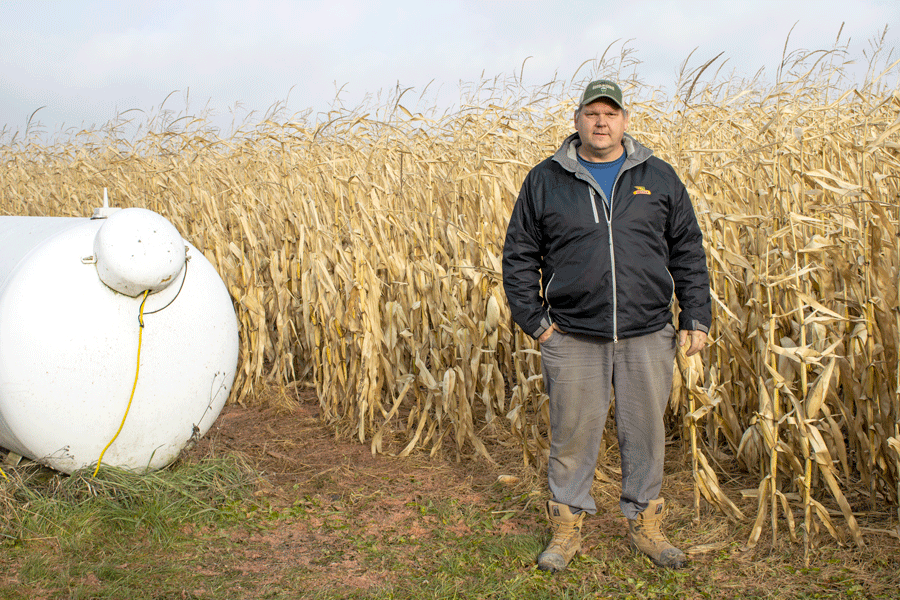WELLINGTON COUNTY – Local farmers breathed a sigh of relief earlier this week when the Canadian National Railway strike was ended.
“Grain farmers in the county are pleased it looks like the strike issue has been settled,” said Henry Van Ankum, a local director with Grain Farmers of Ontario, just hours after the tentative deal was announced on Nov. 26.
The agreement between the railway and Teamsters Canada, the union representing 3,200 CN workers, ended a week-long strike that stalled the transportation of products such as crops, potash, coal, oil and propane.
CN was expected to resume normal operations by 6am on Nov. 27.
Farmers in the region, already forced to deal with a wet spring and a wet harvest season beset with snow and cold weather, were feeling the pinch of a disruption to their supply of propane for drying crops, heating barns and processing commodities.
One day prior to the announcement of the tentative deal, Van Ankum, who’s spent three decades farming in the Alma area, said millions of dollars worth of corn in Wellington County couldn’t be harvested without propane.
“We are kind of getting hit from all sides this year … I’ve never seen a scenario like this before,” he said.
“For the most part harvest has come to a stand still … because no one can get propane fuel to dry this wet corn in our dryers. So that means farm operations have to stop because of things that are out of our control.”
Harvested corn must be dried or it is susceptible to mould and Van Ankum told the Advertiser that if the CN Rail strike had carried on much longer, farmers may have been forced to leave corn in their fields this winter.
“When you do that, it’s a risky game,” he said, noting corn may well stand through the winter, but lots of snow and heavy winds could ruin crops.
“We would rather harvest it now … get it off and safe in the bin. If you can’t get it harvested, you don’t have the storage to feed or to sell, it puts producers in a tough spot.”
Wellington Federation of Agriculture (WFA) president Janet Harrop noted grain producers weren’t the only ones worried about the supply of propane, as many hog and chicken barns are also heated by propane.
She noted agriculture officials have for some time lobbied for the expansion of natural gas lines, as it is more reliable and less expensive than propane.
“The agricultural community has been advocating for access to natural gas as an essential service for years,” said Harrop.
“This strike underscores the need for natural gas in the rural areas.”
Greg Hannam of Woodrill Farms Ltd. also reiterated the need for the long-term expansion of natural gas lines.
“We rely on propane for our operations therefore any uncertainties are hard to manage,” Hannam said of Woodrill, a crop input supply company and grain elevator business near Guelph.
He called the CN Rail strike “a perfect example of why alternatives are needed to help keep businesses sustainable.”
Perth-Wellington MP John Nater said the strike was having “a devastating impact on farmers,” many of whom were told to ration their propane supply or pause their harvest. Others were cut off altogether, he added.
Nater and Wellington-Halton Hills MP Michael Chong had called on Prime Minister Justin Trudeau, agriculture minister Marie-Claude Bibeau and transport minister Marc Garneau to pressure Teamsters Canada and CN Rail to come to an agreement.
Chong, who noted the situation was exacerbated by the fact priority for propane delivery was given to those using it to heat homes, also suggested recalling parliament early to consider emergency legislation to end the labour dispute.
Parliament is set to reconvene on Dec. 5.
“I think that’s too long to wait,” said Chong, one day prior to the announcement of a tentative deal ending the CN strike. Government officials repeatedly stated they favoured negotiations over legislation.
Chong, a longtime proponent of reconvening parliament more quickly following general elections, said the CN Rail strike is a perfect example of why that’s important.
Van Ankum had another suggestion to avoid a similar problem in the future.
“Maybe the government will want to look at making rail service an essential service and try and make sure we don’t end up in this kind of situation again,” he said.
Nater acknowledged local propane suppliers who, during the strike, did “exceptional work trying to get as much propane to people as they can with a real focus on those in dire need.”




